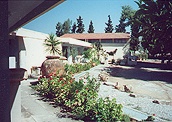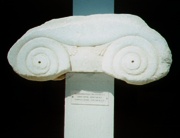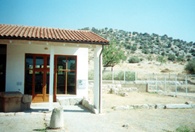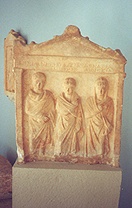Passing ships in the night
We had finished dinner and were waiting for the bill. After catching the waiter's eye, he wondered over. "But, you are not leaving now. The spectacle is about to begin," he said, pointing to the wide bay behind us. We'd noticed that the town was far busier than usual, but as recent arrivals, we had assumed that this was just normal Sunday night activity.
Looking around more closely, it was clear that every table on our beachfront tavern was full, and that the bay itself was lined with people staring out to sea. Turning round, I finally caught sight of the object of their collective gaze: a small wooden fishing boat, decked out with flags and hung with swaying lanterns, anchored offshore.
Two other boats approached, fore and aft, and began firing fireworks at the vessel. Behind them, one of the island's ferries reversed into position and it, too, began to send fireworks off into the night sky, a display that was met with "oohs" and "ahhs" from the crowd. As the final starbursts exploded above the ferry, the fishing boat was set alight and slowly began to sink.
Turing back to the waiter, I asked what it had all been about? "Oh, it celebrates a big sea battle, a great Greek victory over the Turks—all your drinks are free tonight!" Well, it wasn't quite as impressive as the Millennium display we'd watched over the Thames last December, but it was hard to begrudge the free booze.
We clapped appreciatively and ordered another round.
My wife and I were dinning in the Greek town of Eretria, on the island of Evvoia, some fifty miles north of Athens. Ostensibly on a two-week beach holiday—a much-needed break from CER duties—we had also journeyed to this particular corner of Hellas to visit family friends.
The spectacle we'd witnessed that night in the bay was a recreation of a local episode from the Greek war of Independence (fought during the 1820s) that had seen a local man, we were told, sink several Turkish warships in the harbour. True or not, it was a widely, and enthusiastically, celebrated event in the town.
A Greek man and his Cuban-born wife owned the restaurant in which we sat, the delightfully named La Cubana.[1] Their two sons served as waiters and told us how their mother had long ago swum out from her homeland to their father's merchant ship and, hence, to Evvoia—a means of escape not open to those in land-locked Central Europe.
Leaving Herodotus
Before leaving London, we had both agreed not to bring along anything that could be remotely construed as "work." I had hoped to take my well-worn copy of Herodotus along (he had passed through the area some two and half thousand years previously) but that had been vetoed.
So, although I had to leave the "father of history" behind, I was still interested to see, as a non-specialist outsider, what modern Greece's relationship to its past was like.
My interest in such subject matter stems from the fact that I am repeatedly told, usually by people who are old enough to know better, that Central Europe groans under the weight of its own history.
As if such a comment alone explained the region's current problems in its transition to Western style "normalcy," or the lack of a "civil society" (whatever that is).
It is not, of course; they are mistaken. Central Europe groans under the weight of its own resplendent national mythologies, under intentional misunderstandings and misperceptions of the past [2], not history. Greece is no different, nor is Britain for that matter [3], but it is the span and multi-cultural aspect of the enterprise in Hellas that makes it so impressive.
In this sense, it is not only Greece's ancient past, but also the knock-on effects of having been one of the first peoples in Europe to "self-determine" in 1832, as well as having the distinction of being one of the few countries in Southeastern Europe lucky enough to be "saved" from Communism in the late 1940s.
The history bit
To say that Greece is seeped in history is an understatement; it is positively dripping with the ancient past, and both the island of Evvoia and the town of Eretria to which it is home reflect this in microcosm.
The ancient town, its ruins handily located just behind our apartment, was a minor city-state, a rival to Athens until 506 BC, when it came under the latter's domination.
Later,
 |
| Eretria's Museum |
Although the town remained deserted, the island itself experienced several more foreign occupations after the fall of the Byzantine Empire in AD 1453.[4] The Venetians and Ottomans left plenty of evidence of their own long presence in the island's architecture, religion and food.
The modern period has left its mark too, literally. Most of the present inhabitants of Eretria are descendants of refugees who arrived there around 1830 from the island of Psará, off the Turkish coast, after its sacking during the war of independence—one of the first, but by no means last, transfers of ethnic Greek populations from the east.
The industrial age cut its own swathe across the island, and deeply cut marble and copper quarries scar many hillsides. Vast, ugly power stations and factories that wouldn't be out of place in the rust belts of the Czech Republic squat obscenely on the coastal road to Athens.
All this history provides a perspective that makes other "native" peoples of Europe look like ridiculously recent arrivals, and lends much credence to Norman Davies' assertion that, "the idea of exclusive national homelands is a modern fantasy."[5]
Going native
Had I naïvely harboured any thoughts that, however much the relationship between classical and modern Greeks is highly questionable, such a grand lineage might have tempered Greek nationalist sentiments, these ideas would have been swiftly tempered.
Many examples of typically insular and parochial national attitudes could be easily found in the daily English language newspapers, the Athens News and Kathimerini that came free with the International Herald Tribune . This was made particularly apparent in the ongoing debate between the Orthodox Church and the government vexing question of whether religious affiliation should be listed on national identity cards.
This confrontation
 |
| An Ionic column (geddit?) |
I don't pretend to know all the causes of this dynamic but we should recall that, amongst other things, the Church-State divide taken for granted in northwestern Europe, and once enforced in other areas, is not necessarily accepted in Greece. Indeed, quite the reserve seems to be the case, as Greek nationalism and the Orthodox Church are inseparably intertwined.
Tradition has it that it was the Orthodox Archbishop Germanós of Pátra who first raised the rebel flag on 15 March 1821 that started the war of independence against Ottoman rule.
Conservative forces
Such confrontations appeared to me to highlight a central fault line in Greek society—one that has polarised the political scene between a modernising, European and pro-active élite and a far more conservative, patriarchal and religious majority.
The present state of the Greek economy would suggest that these factors also exert influence on Greece's business potential, for although Greece has been an EU member since 1981, and despite its massive tourist industry, it is still a net receiver of EU funds.
Moreover, even though Greece has now achieved Eurozone membership and interest rates are falling after hindering the economy since the 1970s, a recent study by the European Industrial Relations Observatory (EIRO) showed that real wages have risen a mere one percent in the past two decades.
Even preparations for the upcoming 2004 Olympics in Athens are dogged by claims of bureaucratic problems and personality clashes and, to cap it all, the European Court of Human Rights (ECHR) has fined Greece over GRD 100 million (USD 263,000) so far this year for prolonged delays in domestic court proceedings.
Whatever the principle causes of these problems (I suspect that Greece's role in the Cold War was a factor—more on this below), perhaps we shouldn't be too surprised that the EU is dragging its feet over accepting new members from Central Europe when the some its older members still perform so flatly.
The Turkish question
Needless to say, the Turkish question is a crucial one in Greece after some 170 years of on-and-off conflict. Although a simplistic observation, it is worth reiterating that nationalist feelings are always heightened by a palpable threat—and Greeks see no one as palpable a threat as the Turks.
Most Greeks we spoke with felt threatened by Turkish foreign policy, and a few even went so far as to say they believed that Turkey would have invaded by now had Greece not been an EU and NATO member.
Although relations have vastly improved of late, as increased bilateral tourism and Athens's approval of Ankara's EU candidacy would seem to indicate, the situation is still tense, especially as negotiations over Cyprus continue to hang in the balance.
Just how tense was illustrated by Turkish Foreign Minister Ismail Cem's early August comments to the Italian daily La Stampa about Greece's human rights record, which swiftly led to a tit-for-tat exchange of angry accusations with his Greek counterpart, George Papandreou.
Having said that, it is worth noting that Greek concern over Turkey pales in significance compared to their feelings on NATO's increasingly pathetic looking "air display" over Yugoslavia in 1999.
The
 |
| Remains of the House of Mosaics. Built BC 370. |
Only time will tell, of course, but it is looking increasing likely that the Kosovo conflict will be seen as marking the end of the New World Order and a return to the use of a "might is right" based foreign policy more reminiscent of the nineteenth century than the twenty-first.
With Turkey's long experience with such actions in its treatment of the Kurds, it is little wonder Greeks view these developments ominously.
Better dead than red
There was, however, a happier time when Greco-Turkish relations were occasionally more cordial—the Cold War[7], a period which reveals that the relationship between Central Europe and Greece is much closer than might be at first presumed.
The daily newspaper Kathimerini had a small section on the inside page charting the news "50 years ago today." One day, amongst dispatches on the Korean War, then in full swing, I found this sentence, "...that if the need arose, Greece and Turkey would deal jointly with any incursion by the Slavs."[8]
For Slavs read: godless Communist hoards. (Even though, ironically, it had been from Byzantium's capital that, so legend has it, Christianity was first exported to the heathen Slavs.[9])
The Cold War has a special resonance in Greece, for unlike large parts of the rest of Central Europe, she was saved from Communist rule by a bitter civil war between 1944 and 1949. While despite its rhetoric the West has no real interest in preventing Communist domination in those countries to the north, Greece was singled out for salvation.
The man responsible was, of course, Winston Churchill, who in October 1944 signed the "Percentages Agreement"[10] with Stalin, which gave the Russian leader a controlling interest in Romania and Bulgaria, a joint share of Yugoslavia and Churchill control of Greece and Italy.
I hasten to add that his interest was not entirely philanthropic: Greece was a vital piece in the jigsaw of British interests in the eastern Mediterranean, and Churchill's obsession with saving the Empire at any price should never be underestimated. It has also been suggested that he might have had in mind the additional propaganda value of "saving" the birthplace of democracy, though I personally take that with a pinch of salt.
Thus, the Cold War started early in Greece, in December 1944. When Britain announced in early 1947 she could no longer afford to finance the conflict, the Americans stepped in with a newly proclaimed "Truman Doctrine" to finish the job.
The frictions produced by this conflict reached their zenith under the Colonels' military Junta between 1967 to 1974, a period captured in Costa-Gravis' seminal film Z. The regime was eventually overturned by student protests and mass demonstrations reminiscent of those in Eastern Europe 15 years later.
The point of recalling Greece's Cold War past is that the legacy the conflict left still exercises an effect. Not so long ago, Greece was also a state in transition, not from socialist totalitarianism but from a right-wing junta to democracy. The transition left its mark on Greece: reverberations of these experiences can still be seen in the political situation, the relationship between Church and State and the lacklustre performance of the economy.
In the sometimes myopic world of East European studies, many frequently forget that large parts of the globe laboured under regimes as oppressive and bloody as anything behind the Iron Curtain—and as Latin America reminds us, some were even bloodier.
Although the winners write history, as Herodotus knew very well, memories of the totalitarian methods used to contain the spread Communism across the globe still haunt the victors and those who experienced such methods at first hand. This was made particularly evident this summer, as papers were full of articles about the "Pinochet Effect"[11] as former dictators from Brazil to Indonesia were belatedly indicted for human rights abuses years after Eastern Europeans began to deal with their own, similar problems.
I am not suggesting for a moment that Greece's totalitarian experiences were in the same league, but rather that salvation from Communism in 1949 had a price—Greece is still paying it.
Bar-B-Qs in Arcadia
All of which leads me, finally, to our family friends on the island, "Pani" Vaska and her husband Josef, friends of my wife's mother, whom we had come to visit.
Vaska

|
She had spent most of her life in Southern Moravia, married a Czech man and they only returned to Greece in the mid-1980s when bilateral Greek-Czechoslovak agreements were signed.
It was in their garden that we were introduced to their friends, neighbours, extended family and many of the topics covered above—carried out in a Babel-like mixture of English, Czech and Greek.
Here, we enjoyed traditional Greek dishes and Josef's gargantuan barbecue, on which he expertly grilled the catch of the day. Under the cover of lemon, olive and fig trees, serenaded by the crickets, we admired their vine-covered veranda and drank the home-made wine its fruits supplied.
Thinking back, I recall a phrase I heard on more than a few occasions whilst in Greece, one that's worth quoting here in conclusion: "In other countries they have the money—in Greece we have the Life"—words of wisdom for which I am able to vouch that put economic indicators, political disputes and history all firmly in their place.
Martin D Brown, 11 September 2000
Moving on:
- Browse through the CER eBookstore for electronic books
- Buy English-language books on Greece through CER
- Return to CER front page
Links and Sources
Perseus Project Home Page on Classical Greece
Greek history 1200 BC to 323 BC
Commentary on Herodotus
Links page on Byzantine, Ottoman and Modern Greek History
Primary Documents in Greek History
Modern Greek history resources
Links on contemporary Greece
Footnotes
1. 44 Archeou Theatrou Street, Beach of Eretria, Evvoia. Tel: 0229-61665
2. For those still unclear on the difference—or worse still, labouring under the tyranny of post-modern interpretations of what history should be—may I recommend Richard Evans' In Defence of History [OUP, London 1998] (purchase from Amazon.com) (purchase from Amazon.co.uk) and Shöpflin and Hoskin's Myths and Nationhood [C Hurst and Co, London, 1997] (purchase from Amazon.com) (purchase from Amazon.co.uk). For those still sceptical about history's ability to subvert the towering edifices of national myths, I would recommend a reading of Israeli historian Avi Shlaim's The Iron Wall, a perfect example of good history in action, well researched and truly challenging.
3. In Britain, the recent anniversary of the evacuation from Dunkirk was a case in point. Not only has the British army's utter defeat in France in 1940 been "magically" transformed into a victory, but the celebrations also saw repeated reference to that other great Western myth—the delusional belief that it was D-Day alone that heralded the liberation of occupied Europe.
Such views are at the heart of many "little Englanders" who moan on about the necessity of protecting the Pound, which we have had in its present form only since 14 February 1971, and mounting resistance to further integration into Europe. It is a mythological cosmology that basically revolves around the triple delusions of "we're the mother of all democracies—so we're superior to you!"—"we used to have a big empire—so we're superior to you!" and "The nasty Germans never occupied us—so we're superior to you!"
Some years ago Germany's Minister of Cultural Affairs had the temerity to suggest that the British were still obsessed with the last world war—of course we are! It was the last time Britain did anything of significance. Apart from winning the 1966 World Cup, the rest of the century has been one long steady "retreat from power." Today, Britain is a country that relies on past laurels to underpin contemporary fantasies about its ability to play "world's policeman," an ability wholly dependent on good relations with the United States for the delivery of the necessary high-tech weaponry.
September marks the anniversary of the Battle of Britain. Cue yet more sentimental mythologising.
4. My own knowledge of this period is largely, if not solely, based on John Julius Norwich's excellent three volume history of Byzantium, The Early Centuries (purchase from Amazon.com) (purchase from Amazon.co.uk), Apogee (purchase from Amazon.com)(purchase from Amazon.co.uk) and Decline and Fall (purchase from Amazon.com)(purchase from Amazon.co.uk). His two volumes on the History of Venice (purchase from Amazon.com)(purchase from Amazon.co.uk) are also worth reading.
5. Davies, N, (1996), Europe A History, OUP, London, p 217 (purchase from Amazon.com)(purchase from Amazon.co.uk)
6. David Pacifico, a British subject, lost property in riots in Athens in 1847. The Greek government refused remuneration and, after Pacifico appealed to London for aid, the Prime Minister Viscount Palmerston sent the British fleet to Athens. The British then demanded the Greeks pay up or be bombarded—they paid up.
7. See The Cold War International History Project for more information.
8. Kathimerini, Wednesday, 9 August 2000, p 2 left hand column.
9. Norwich, JJ, (1993), Byzantium. The Apogee, Penguin, London, pp 71-74.
10. I once made the mistake of referring to the "infamous Percentages Agreement" in an MA seminar. My tutor, Dr Maurice Pearton, quickly corrected my inaccurate description. His article "Puzzle about the Percentages" in Occasional Papers in Romanian Studies, No 1, 1995, (Ed) Deletant, D, pp 7-13, is still one of the best on the subject. The original document, with Stalin's blue pencil tick, can be viewed at the Public Records Officein London, PREM 3,66-7.
11. International Herald Tribune, International Section, "'Pinochet Effect' Exposes Once-Untouchable Ex-dictators," Monday, 7 August 2000, p 9.




